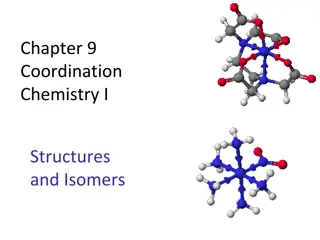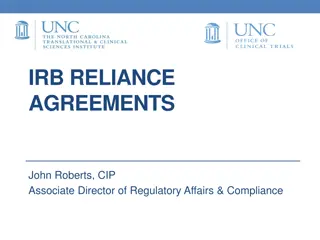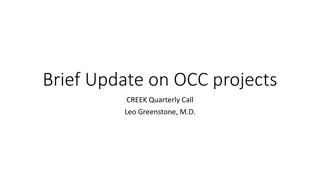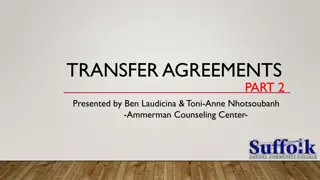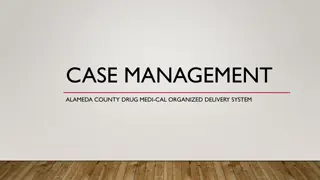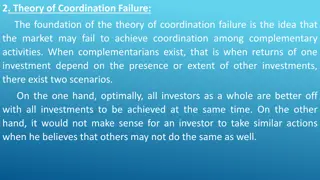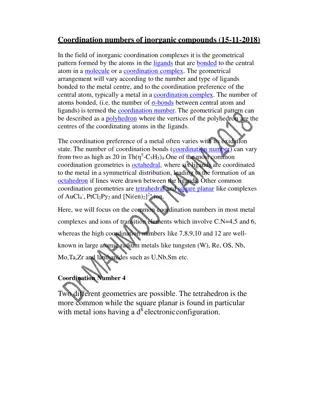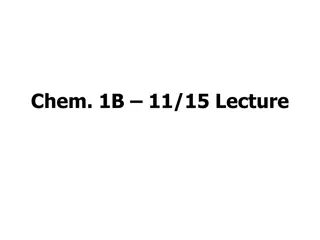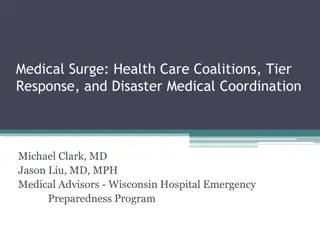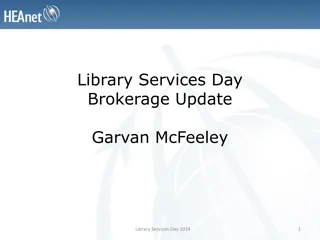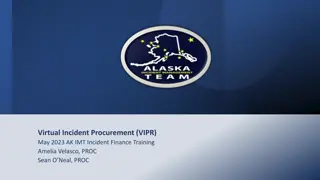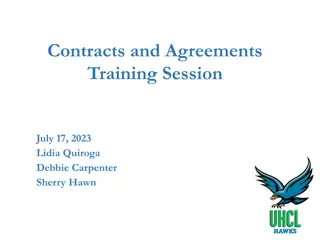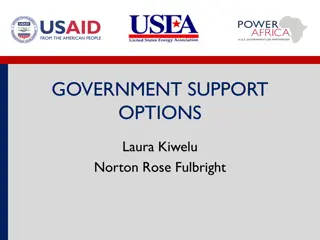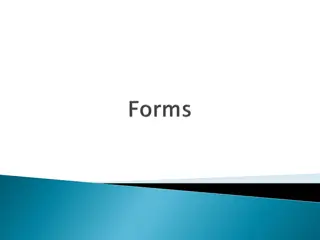Enhancing Care Coordination Through Agreements
Effective care coordination is crucial for ensuring quality referrals and improving patient outcomes. Develop a Care Coordination Agreement to streamline the referral process, reduce waste, and enhance cost-effectiveness in healthcare delivery. This agreement serves as a roadmap for standardizing communication and clinical responsibilities among healthcare teams, ultimately leading to patient-centered, high-value care coordination.
Download Presentation

Please find below an Image/Link to download the presentation.
The content on the website is provided AS IS for your information and personal use only. It may not be sold, licensed, or shared on other websites without obtaining consent from the author. Download presentation by click this link. If you encounter any issues during the download, it is possible that the publisher has removed the file from their server.
E N D
Presentation Transcript
the Medical Neighborhood Connecting Care Ensuring Quality Referrals and Effective Care Coordination Action Step # 4: Create a Care Coordination Agreement ACP SAN special project for implementing High Value Care Coordination Carol Greenlee MD FACP & Beth Neuhalfen
The ACP Support & Alignment Network High Value Care Coordination pilot project Action Steps to Connected Care 1. Look at your internal referral process (get your own house in order) 2. Ensure you get what you need for a high value referral 3. Ensure the others gets what they need 4. Develop Care Coordination Agreement(s) (compact) with appropriate referring practice(s) 2
As you listen Think about developing a care coordination agreement With which practice(s) would it be beneficial to develop a CCA What do you need & want in a care coordination agreement to improve the referral process for Patients Clinicians and practices Reducing waste and improving cost effectiveness How could this improve access to care 3
Putting it all together-Connecting Care Building the bridge abutments getting your own house in order Securing the connecting pieces: the referral request the referral response Establishing the bridge: a Care Coordination Agreement for the Referral process 4
Ideally Patient-Centered High Value Care Coordination would be standard of care with every clinical team doing what is needed to coordinate, connect and share the care for our patients whenever and wherever that care may take them 5
To help us get there Care Coordination Agreements provide A starting point And A roadmap 6
What is a Care Coordination Agreement? Platform that everyone agrees to work from: Standardized definitions Agreed upon expectations regarding communication and clinical responsibilities. Can be formal or informal Also called Care Coordination Compact or Collaborative Care Agreement / Compact 7
Who and How? Practices you work with frequently Including multispecialty groups in same organization Practices you need more from PCP needing timely referral response notes Specialty group needing more than ICD code with referrals PCP needing colonoscopy reports from GI group Surgeon needing pre-op prep assistance Practices you need less from Chart dump with referrals 40 page referral response notes (with every order, etc. in it) 8
Models for Establishing Agreements One-on-One Compacts with selected medical neighbors PCP practice with specialist / specialty to specialty ACO with a specialty System-wide adoption (all players within system) Closed or integrated systems (VA, ACO, IPA) Unilateral approach Medical Center / Specialty Practice ( This is how we agree to work with those who refer to our center/practice and this is what we would like from you when you refer a patient ) 9
Example of Formal 1-on-1 CCA (PCP with Specialty) 10
Example of Informal 1-on-1 CCA (Specialty to Specialty) Endocrinology with Endocrine Surgeon Work closely together for surgical cases involving parathyroid/thyroid/adrenal issues Evolved & continuously evolving understanding of information, communication & collaboration needs Clear clinical questions/ reason for referral Detailed summary / discussions-calls Defined expectations around roles & responsibilities Defined expectations around shared information, communication and care collaboration 11
Example of System-wide CCA for IPA (Independent Physicians Association) Focus on Referral Process : Referral Request Clinical question Supporting data Prepared Patient Referral Response Address clinical question Referral Tracking Confirmation of appointment or decline (redirect) referral Notification of No Show or Cancellation 12
Example of System-wide CCA for Employed Multi-Specialty Physicians group 13
Wide Specialty Referral Base Most specialists have a wide geographic referral base Large institutions & Academic Medical Centers Many, if not most, referrals come from outside the system or institution Private practice or smaller institutions Patients come from distant locations & a variety of referral sources Consider a Unilateral Care Coordination Agreement 14
Serving the entire referral base Mesa County Physicians IPA -295 physicians Group CCA In Western CO there are 2000+ Physicians, NPs, PAs, CNMW In Eastern Utah ~ 100 clinicians 15
Example of Unilateral CCA PLEASE SHARE THIS WITH YOUR PHYSICIANS AND ADVANCED PRACTICE PROVIDERS We want to provide you with value-added and appropriate assistance with your ENDOCRINOLOGY referrals. Please note the requested information. Feel free to use your own referral form but please do include as much of the information as possible to help us expedite your patient s referral. Providing a summary of the issues necessitating referral or a clinical question will help us ensure that we address the appropriate concerns and also will help us triage the referral. Every referral request is reviewed by the staff and our physician upon receipt. We may ask that you do some additional testing prior to referral to prevent delay or to further define the process for your patient. We want to be sure that you and your patient get the advice and assistance to care that is requested. We are working to align our referral response to meet those aims. We will do our best to tie into any CARE PLAN that has been established for the patient and to outline any endocrine care plan or action plan items. As we all know, this is a work in progress for all of us and please feel free to let us know if there are additional items or a different format that would be of more help to you in coordinating the care of our common patients. Sincerely and Thank You, Carol Greenlee MD and the staff of Western Slope Endocrinology 16
Western Slope Endocrinology Referral Form (CCA) We will call the patient to schedule the appointment if appropriate and will notify you of the appointment date and time. We will also notify you if we determine that the referral is not appropriate for our practice or if we are unable to schedule the patient. We will send a referral response note usually within 2-3 days of seeing the patient. We most often send this by fax from our EMR. 17
Demographics Full Legal Name: _______________________________________________DOB: ______________________ Home Phone: _____________________ Cell: _____________________ Work: ________________________ Referring Provider: ____________________________________________ Phone: _____________________ Referral Information Clinical Question or Reason for referral (summary is helpful): Type of Referral requested: ___Medical Consultation: Evaluate and advise with recommendations for management sent back to me ___Co-management: I prefer to share the care for the referred condition (PCP lead) ___Co-management: Please assume principal care for the referred condition (Specialist assumes care) ___Have Specialist determine which is most appropriate after their assessment of the patient Is this routine____ or urgent____? If urgent please indicate why and consider calling Dr. Greenlee to help us expedite care. Is the patient aware that they have been referred to us and why? ___________________ Are there any special needs such as issues with mental competence, language or physical issues? Is the patient the contact person? ______ If not, who is? __________________________________ Please include clinical data that is pertinent to the referral: The patient s core medical information (Demographics, Medication list, Allergy list, Problem list, etc) Labs Radiology reports Clinical notes Any additional medical history that is useful If you have a CARE PLAN on this patient, please attach 18
WSE Unilateral CCA Secondary Referrals If you are referring the patient for a condition that may need endocrine surgery such as thyroid cancer, large multi-nodular goiter, hyperparathyroidism or a large pituitary adenoma please indicate if you and the patient have a preference for the surgeon. Otherwise, we will work with the patient and their needs and preferences to match the best surgeon for their situation. We will also help manage any needed perioperative endocrine care. If a patient using an insulin pump develops a site infection, we will refer to an appropriate and available surgeon if I&D is needed or may call on the local PCP to help with assessment and appropriate referral as needed. Occasionally endocrine patients need urgent ophthalmologic assessment for Graves Ophthalmopathy, optic nerve compression or retinal hemorrhage. Dr. Greenlee will refer to the most appropriate and available ophthalmologist in these situations. 19
Referral Request Elements Before & After Unilateral WSE CCA Referral Form Basic Data Clinical Question/RfR 120% 100.00% 100% 80.00% 80% 60.00% 60% Baseline 40.00% 40% Baseline Follow Up 20% 20.00% Follow up 0% 0.00% Pertinent Data 60.00% 50.00% 40.00% Baseline 30.00% 20.00% Follow Up 10.00% 0.00% 20
Primary Care Unilateral CCA Wrap it into the referral request (spell it out) 38 yo female with suppressed TSH confirmed on repeat testing along with elevated fT4 (see attached), please evaluate for cause of hyperthyroidism and help with selection of most appropriate treatment option Patient is in care management, she has unreliable phone & transportation services, please contact her care manager Ginger Rogers at 123-456-7890 for help with scheduling any tests or imaging Please contact us before any secondary referrals Patient is under controlled substance agreement She is in CO Medicaid Prime plan (Value Based-Shared Savings plan) 21
Take a minute Do you have formal or informal care coordination or referral agreements with another practice now? With which practice or practices would you most like to work out a care coordination or referral agreement ? What type of agreements (one-on-one or system- wide) might be best to start with in your situation? 22
Getting Started Decide what to include in the Care Coordination Agreement Start with basics (elements of good referral process) Add in co-management elements if & when ready / needed Include critical issues that need to be addressed Have a conversation we really enjoy seeing your patients/we so appreciate your help with our patients it would help us if or we want to be sure you are getting what you need Decide on forms Serves as checklist, helps with team care around referral 23
Basics that Benefit Having a conversation Defining needs Many misperceptions Benefit of discussing issues/working together Forms - Formal Agreement Defines the elements (reference, enduring, modifiable) Reinforces/encourages completeness ( compliance ) Hard stop for clinical questions Patient informed check box Enhances tracking & team roles 24
What is Included in the Care Compact ? (start with the basics) 1. Preparation of the patient 2. Type of referral /role of the specialist 3. Provide a clinical question with all referrals 4. Core data set to accompany all referral. 5. Pertinent supporting data for the referral 6. Communication protocol 7. Critical elements of the referral response 8. Protocol for making appointments 9. Closing the Loop protocol 25
Connecting the Agreement Pieces The Referral Request checklist elements Scheduling protocol Close the loop referral tracking The Referral Response checklist elements Referral Guidelines List of urgent-intermediate-routine referral conditions Pertinent data sets / referral guidelines for specific conditions Agreement on how to handle secondary diagnoses Specifications on making secondary referrals 26
Template Care Coordination Agreement Template Care Coordination Agreement PCP / Requesting Neighbor / Responding Review Referral Requests and Triage According to Urgency Reserve spaces in schedule to allow for urgent care Notify referring provider of recognized referral guidelines and inappropriate referrals Work with referring provider to expedite care in urgent cases Verify insurance status Anticipate special needs of patient/family -- Agree to engage in pre-referral consult if requested. _ Provide PCP with number for direct contact for urgent/immediate matters. Provide appropriate and adequate information in a timely manner* To include specific response to referral question; verify type role; any changes to diagnosis; medication; equipment; testing; procedures; education; referrals; follow up recommendations or needed actions * See provided model check list of suggested areas to address. Prepare patient Use of referral guidelines where available Patient/family aware of and in agreement with reason for referral, type of referral, and selection of specialist Expectations for events and outcomes of referral Provide appropriate and adequate information* Demographic and insurance information Reason for referral, details Core Medical Data on patient Clinical data pertinent to reason for referral -- Any special needs of patient. Indicate type of referral requested: Pre-visit Preparation/Assistance Consultation (Evaluate and Advise) Procedure Co-management with Shared Care Co-management with Principal Care Full responsibility for all patient care * See provided model check list of suggested areas to address. 12
Template Care Coordination Agreement PCP / Requesting PCP / Requesting Neighbor / Responding Neighbor / Responding Indication of urgency - Direct contact with specialist for urgent cases Provide Neighbor with number for direct contact for additional information or urgent matters Needs to be answered by responsible contact Review secondary diagnoses or suggested referrals identified by Neighbor/specialist. If co-managing with Neighbor, provide them with any changes in patient s clinical status relevant to the condition being addressed by the Neighbor. Contact the patient, if deemed appropriate, when notified by Neighbor of failure to keep appointment. Indicate acceptance of referral category or suggest alternate option and reasoning for change. Refer follow-up of any secondary diagnoses (additional disorders identified or suspected) back to the PCP for handling unless directly related to the referred problem. If secondary diagnosis is followed up by Neighbor, notify PCP. Information regarding any secondary referrals made by Neighbor needs to be communicated to PCP. Notify Referring Provider of No Shows and Cancellations. If patient is self-referred or referred by another specialist/Neighbor, the PCP provider needs to be copied on the referral response upon obtaining appropriate patient permission. 13
Example Guide for Care Coordination Agreement The Mutual Agreement section of the tables reflect the core elements of the PCMH and Medical Neighborhood and outline expectations from both primary care and specialty care providers. (When patients self-refer to specialty care, processes should be in place to determine the patient s overall needs and reintegrate further care with the PCMH, as appropriate.) 29
Example Guide for Care Coordination Agreement The Expectations section of the table provides flexibility to choose what services can be provided depending on the nature of your practice and the working arrangement with PCP or specialist Provides an area to add, delete or modify expectations 30
Put it in action. Identify another practice or practices that would be good to establish a care coordination agreement with Have prepared offers & requests of what you can provide and what you would like them to provide Include what might be made available through EHR Set up meeting with the practice teams or representatives from both practices Mutually discuss and determine what needs to go into the agreement 31
Take a minute Think about how having a care coordination agreement to improve the referral process can improve access to specialty care List some ways this might help access to your practice or clinic 32
Improved Referral Process- Improved Access Fewer inappropriate referrals (8% of referrals -average 43/specialist/year) Pre-consultation request & review processes Fewer No Shows Prepared patient- participant in care Fewer extra (additional) follow up appointments needed (60-70% of referrals to specialist lack information) High Value Referral Request Referral guidelines (pertinent data sets) Pre-consultation request & review processes 33
Improved Referral Process- Improved Access Just by improving the referral process(including pre-consultation request & review process) for high value referrals- improve access If able to add in use of e-consults (virtual clinician-to-clinician assistance)- even further improvement to access 34
E-consult vs Pre-consult E-consult = a referral that would have needed to be face-to-face if e-consult had not been available but was no longer needed because of advice received through the e-consult process Pre-consult = does not need a referral (no further assessment or management needed) or very straight-forward help or needs a different specialty type or preparation for face-to-face 35
Examples of Pre- and E-consultations Pre-consultation Are these slightly abnormal thyroid function studies of concern? Do they need further evaluation? E-consultation A tele-derm photo of a skin eruption with which the referring clinician may not be familiar but which dermatology clinician recognizes (e.g. nummular eczema) able to provide adequate suggestions for treatment; the patient is started on the correct treatment and responds, a visit to Dermatology is avoided The response might be No concern, no further evaluation needed Recommend this additional testing These are concerning, recommend formal 36
Impact on Wait Times of Pre & E-consultations SFGH 225? Wait? Time? for? New? Pa ent? Appointment? Endocrinology? 200? Rheumatology? 175? Pulmonary? 150? Cardiology? (days)? Nephrology? 125? 100? 75? 50? 25? 0? 0? 3? 6? 9? 12? Courtesy E. Murphy SFGH Months? since? Ini a on? of? E-referral? 37
SFGH - Referral Disposition Scheduled immediately for face-to-face appointment Ave 50-82% (ave ~60%) by surgical and women s health reviewers Vs 27-76% (ave 48.6%) by medical sub-specialties Highest Neurology & rheumatology; Lowest Endocrine, Allergy, Hematology & Hepatology 66% by NP reviewers Vs 50.9% by Physician reviewers Scheduled after Pre-consultation exchange: 7-35% Pure e-consultation: 7.7-59.3% Reviewers paid 10% FTE or 4 hours/week: including Pre & E-consult work 38
Ottawa Hospital- Factors for Success for e-Consults % avoided face-to-face referral Specialty Type Dermatology 49.5% / Hematology 46.5%/ Endocrinology 45% Vs Rheumatology 24.1% / OB GYN 28.2% / Neurology 30.8% Clinical Question Type What should I do / what would you do? - 44% Specific issues desired to be addressed - 30 to 47% Vs Does this patient need a referral ? - 25% Reviewers paid $200/hour pro-rated; includes e-consult work 39
E-Consult project at UCSF 72 hour expectation Specialist can convert to a scheduled visit for case complexity Fielded by mid/senior-level specialist 0.5 wRVU payment to Specialist 0.5 wRVU credit for PCP (toward productivity) 40
E-Consult Drivers Patient Perspective I have a problem today Another appointment can be a challenge: Missed work / arrange child care Out of pocket costs: Co-pay travel parking = $50+ 41
E-Consult Drivers PCP Perspective Quick access to specialty guidance A new specialist = more care coordination I know the patient and scope of the question Sometimes I want to own the problem I know the family / I speak the language Physician visits are a hardship The patient may not follow through with a specialty visit 42
Examples of E-Consult Cases Incidental lung nodule Coronary Ca in LAD noted on chest CT obtained for cough. further work-up? Bisphosphonate for 10 years. Should she continue in light of new evidence?' "Irregular Z-line" on upper endoscopy in 2006. Does she need surveillance for GERD? Is this Patient a candidate for HCV treatment? PPD Conversion, breast feeding, should I start treatment? 43
Process Measures 14% were converted by specialists to in-office visits. 77% were completed within 72 hours Time spent responding to each e-Consult <10 min = 56% 10-20 min = 36% >20 min = 8% 44
Provider Surveys Specialist Survey 65% strongly agreed that the e-Consult question was clear 61% strongly agreed that the question was of optimal complexity Primary Care Survey 83% strongly agreed that the e-Consult response influenced their care plan 45
Access to Care: Infectious Diseases Care Provided by UCSF I.D. for Core Population: eConsults & New Patient Visits Care Provided by UCSF I.D. for Core Population with 14-Day Target (Office Visit + eConsult) 46
Take a minute Is there a place yet for E-consults in your practice or system? 47
Put it in action. Look at the wait time for routine new patient appointments or follow up appointments to your practice or clinic Ensure use of Pre-consultation review to sort out referrals that are inappropriate & to be sure referrals you see are prepared (high value) Identify referral conditions or questions that might be able to be handle by e-consults (virtual clinician- to-clinician consultation) 48
Leave in action. Develop a Care Coordination Agreement Work with at least one referring or referred to practice Develop expectations & agreement of the elements to be included in a Referral Request & Referral Response for all referrals Consider including referral guidelines for specific conditions Utilize the High Value Care Coordination referral processes to maximize access to your clinic or practice Monitor to be sure you efforts are sustained Follow wait times & track referrals 49


